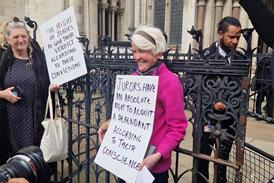Decisions filed recently with the Law Society (which may be subject to appeal)
Mark Reginald Stuart Hodge
Application 12190-2021
Admitted 1991
Hearing 16 July 2021
Reasons 26 July 2021
The Solicitors Disciplinary Tribunal ordered that the respondent should be struck off the roll.
By virtue of his convictions for the offences set out below, the respondent had breached principles 2 and 6 of the SRA Principles 2011.
The respondent had been convicted, after trial, of two counts of rape of a female aged 16 or over contrary to section 1 of the Sexual Offences Act 2003; two counts of sexual assault against a female contrary to section 3 of the act; and one count of sexual assault on a female by penetration contrary to section 2 of the act.
He was sentenced to a total of 11 years’ imprisonment and placed on the Sex Offenders Register indefinitely, the barring list, and issued with a restraining order.
The parties had invited the SDT to deal with the allegations against the respondent in accordance with a statement of agreed facts and outcome.
There were a substantial number of aggravating features to the respondent’s conduct, including that the victim, who was intoxicated, was known to him, and that his conduct was deliberate, planned and repeated in that he had sexually violated her five times in her own home.
All of the mitigating features advanced by the respondent were rejected. Weighing all of the factors in the balance, the SDT concurred with the proposed sanction submitted by the parties.
There was no place on the roll for those who had committed serious sexual offences. The protection of the public and maintenance of public confidence in the legal profession required the respondent to be struck off the roll.
The respondent was ordered to pay costs of £2,000.
Maxine Barnes
Application 12165-2021
Admitted 2001
Hearings 5-9 July 2021
Reasons 26 August 2021
The SDT ordered that the respondent should be struck off the roll.
While she was in practice as a solicitor and director at Furse Sanders Limited, the respondent had caused or allowed the firm to undertake and charge for work done under a lasting power of attorney for client A in the knowledge that the LPA had been revoked, thereby breaching principles 2, 6 and 10 of the SRA Principles 2011. She had acted dishonestly.
In respect of client A, she had caused or allowed the firm to withdraw monies from the client account for the firm’s costs without providing written notification to client A of the costs incurred and in excess of what had been agreed and/or fair and reasonable, thereby breaching rules 17.2, 20.1 and 20.3 of the SRA Accounts Rules 2011, principles 2, 4, 6 and 10 of the principles and failing to achieve outcomes (1.12) and (1.13) of the SRA Code of Conduct 2011.
While acting in the estate of JD (deceased), she had caused or allowed the firm to raise a bill of costs totalling £40,315.80, which exceeded the fixed fee agreed with the estate’s executors, and she had withdrawn monies totalling around £37,915.80 from the client account which was in excess of the agreed fixed fee, thereby breaching rules 6.1, 7.1, 7.2, and 20.1 and principles 2, 4, 6 and 10.
She had caused or allowed one or more improper transfers of client money to be made from the firm’s client account to an unregulated entity which did not operate a client account, thereby breaching rules 6.1, and 14.1 and 20.1 of the rules and principles 2, 4, 6 and 10.
The respondent had been motivated by financial gain, and had caused harm to her clients. Her conduct had been aggravated by her proven dishonesty, and had been deliberate, calculated, repeated and had continued over a period of time.
She had displayed limited insight into her misconduct. She had a previously unblemished record and had co-operated with the applicant’s investigation.
The SDT did not find any circumstances (and indeed none had been submitted) that were enough to bring the respondent in line with the residual exceptional circumstances category referred to in the case of Sharma.
In view of the serious nature of the misconduct, in that it involved dishonesty, the only appropriate and proportionate sanction was to strike the respondent off the roll.
The respondent was ordered to pay costs of £20,000.
Mohammed Arshad Amin
Application 12173-2021
Admitted 2003
Hearing 13-14 July 2021
Reasons 10 August 2021
The SDT ordered that the respondent should be struck off the roll.
The respondent, formerly the sole director at Octagon Solicitors Limited, had allowed a client account shortage in the sum of £27,551.25 to exist, in breach of rule 20.6 of the SRA Accounts Rules 2011 and principles 2, 4, 6 and 10 of the SRA Principles 2011.
He had caused or permitted client monies in the sum of £16,000 to be improperly withdrawn from the firm’s client account in breach of rule 20.1(a) of the rules and principles 2, 4, 6 and 10 of the principles. He had acted dishonestly.
He had failed to reconcile the firm’s accounts every five weeks in breach of rule 29.12 of the rules and principles 2 and 6 of the principles, and of rule 8.3 of the SRA Accounts Rules 2019 and principles 2 and 5 of the SRA Principles 2019.
He had failed to cooperate with the SRA’s investigation into the firm and his practice there, in breach of principles 2, 4 and 5 of the 2019 principles and of rules 7.3 and 7.4(a) of the SRA Code of Conduct for Solicitors 2019. He had acted dishonestly.
He had failed to perform an orderly closure of the firm in breach of principles 2 and 5 of the 2019 principles and of rule 7.3 of the code.
He had failed to ensure that the firm provided a proper standard of service to and acted in the best interests of client Ms A, in breach of principles 2, 4, 5 and 6 of the 2011 principles and of principles 2, 5 and 7 of the 2019 principles and rules 3.2 and 3.4 of the code.
He had failed to ensure that the firm provided a proper standard of service to and acted in the best interests of client Ms W, in breach of principles 2, 4, 5 and 6 of the 2011 principles and of principles 2, 5 and 7 of the 2019 principles and rules 3.2 and 3.4 of the 2019 code.
The misconduct was at the highest level and, in the absence of any exceptional circumstances, the only appropriate sanction was a strike-off.
The respondent was ordered to pay costs of £14,586.
Peter Maxfield Martin
Application 12168-2020
Admitted 1989
Hearings 20-22 July, 28 July and 2 August 2021
Reasons 31 August 2021
The SDT ordered that the respondent should be suspended from practice for 12 months from 28 July 2021.
While in practice as a solicitor at Gomer Williams & Co Limited, the respondent had submitted his application for mental health reaccreditation, with a declaration he had completed and signed off in the name of Gareth Gwyndaf Jones (GGJ), certifying that its contents were correct and confirming that GGJ had read and understood the declaration, when he knew that to be untrue, thereby breaching principles 2 and 6 of the SRA Principles 2011. The respondent had acted dishonestly.
The respondent had suggested to the firm that they withdraw the allegation they had made about him to the Law Society referring to reporting alleged breaches by the firm of the Civil and Criminal Contracts, thereby breaching principles 2 and 6.
The respondent’s motivation was to complete and submit the form on time. He had not misrepresented the facts behind the application. Within the context of allegations of dishonesty, his culpability was, therefore, low.
It was a one-off event in which he had acted on the implied authority of Mr Jones to complete a declaration on an otherwise honest application form. The dishonest conduct had not been driven by personal gain other than the accreditation which he was seeking to achieve for himself and the firm.
The act of completing the declaration would have taken a matter of moments and there had not been a continuation of the dishonesty. Those circumstances were unique to the extent of being exceptional.
The appropriate sanction was an immediate suspension. The misconduct was serious and it was important to send a message to the profession that solicitors must not sign documents in the name of someone else, regardless of any authority that they may have been given for doing so.
In all the circumstances, the appropriate length of suspension was 12 months.
The respondent was ordered to pay costs of £9,525.24.


















![David Lester (senior partner at Blythe Liggins), Darryl Barnes, Jagdeep Sandher (head of dispute resolution at Blythe Liggins)[4]](https://d1d8vslyhr7rdg.cloudfront.net/Pictures/274x183/4/2/8/116428_davidlesterseniorpartneratblytheligginsdarrylbarnesjagdeepsandherheadofdisputeresolutionatblytheliggins4_981603_crop.jpg)







